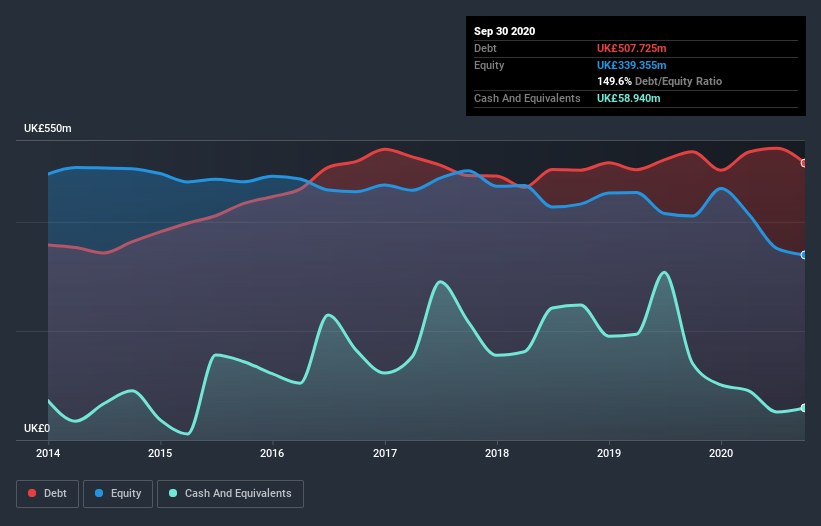- United States
- /
- Entertainment
- /
- NYSE:MANU
Would Manchester United (NYSE:MANU) Be Better Off With Less Debt?

David Iben put it well when he said, 'Volatility is not a risk we care about. What we care about is avoiding the permanent loss of capital.' When we think about how risky a company is, we always like to look at its use of debt, since debt overload can lead to ruin. As with many other companies Manchester United plc (NYSE:MANU) makes use of debt. But the more important question is: how much risk is that debt creating?
When Is Debt Dangerous?
Debt assists a business until the business has trouble paying it off, either with new capital or with free cash flow. Ultimately, if the company can't fulfill its legal obligations to repay debt, shareholders could walk away with nothing. However, a more common (but still painful) scenario is that it has to raise new equity capital at a low price, thus permanently diluting shareholders. Having said that, the most common situation is where a company manages its debt reasonably well - and to its own advantage. When we examine debt levels, we first consider both cash and debt levels, together.
See our latest analysis for Manchester United
How Much Debt Does Manchester United Carry?
As you can see below, Manchester United had UK£507.7m of debt, at September 2020, which is about the same as the year before. You can click the chart for greater detail. However, it does have UK£58.9m in cash offsetting this, leading to net debt of about UK£448.8m.

How Strong Is Manchester United's Balance Sheet?
Zooming in on the latest balance sheet data, we can see that Manchester United had liabilities of UK£364.9m due within 12 months and liabilities of UK£617.3m due beyond that. Offsetting these obligations, it had cash of UK£58.9m as well as receivables valued at UK£98.3m due within 12 months. So its liabilities outweigh the sum of its cash and (near-term) receivables by UK£825.0m.
This deficit isn't so bad because Manchester United is worth UK£2.00b, and thus could probably raise enough capital to shore up its balance sheet, if the need arose. But it's clear that we should definitely closely examine whether it can manage its debt without dilution. There's no doubt that we learn most about debt from the balance sheet. But ultimately the future profitability of the business will decide if Manchester United can strengthen its balance sheet over time. So if you want to see what the professionals think, you might find this free report on analyst profit forecasts to be interesting.
In the last year Manchester United had a loss before interest and tax, and actually shrunk its revenue by 23%, to UK£483m. That makes us nervous, to say the least.
Caveat Emptor
Not only did Manchester United's revenue slip over the last twelve months, but it also produced negative earnings before interest and tax (EBIT). Indeed, it lost UK£24m at the EBIT level. Considering that alongside the liabilities mentioned above does not give us much confidence that company should be using so much debt. Quite frankly we think the balance sheet is far from match-fit, although it could be improved with time. Another cause for caution is that is bled UK£32m in negative free cash flow over the last twelve months. So suffice it to say we do consider the stock to be risky. When analysing debt levels, the balance sheet is the obvious place to start. However, not all investment risk resides within the balance sheet - far from it. Be aware that Manchester United is showing 1 warning sign in our investment analysis , you should know about...
If you're interested in investing in businesses that can grow profits without the burden of debt, then check out this free list of growing businesses that have net cash on the balance sheet.
If you decide to trade Manchester United, use the lowest-cost* platform that is rated #1 Overall by Barron’s, Interactive Brokers. Trade stocks, options, futures, forex, bonds and funds on 135 markets, all from a single integrated account. Promoted
New: Manage All Your Stock Portfolios in One Place
We've created the ultimate portfolio companion for stock investors, and it's free.
• Connect an unlimited number of Portfolios and see your total in one currency
• Be alerted to new Warning Signs or Risks via email or mobile
• Track the Fair Value of your stocks
This article by Simply Wall St is general in nature. It does not constitute a recommendation to buy or sell any stock, and does not take account of your objectives, or your financial situation. We aim to bring you long-term focused analysis driven by fundamental data. Note that our analysis may not factor in the latest price-sensitive company announcements or qualitative material. Simply Wall St has no position in any stocks mentioned.
*Interactive Brokers Rated Lowest Cost Broker by StockBrokers.com Annual Online Review 2020
Have feedback on this article? Concerned about the content? Get in touch with us directly. Alternatively, email editorial-team (at) simplywallst.com.
About NYSE:MANU
Manchester United
Operates a professional sports team in the United Kingdom.
Very low with weak fundamentals.
Market Insights
Community Narratives



